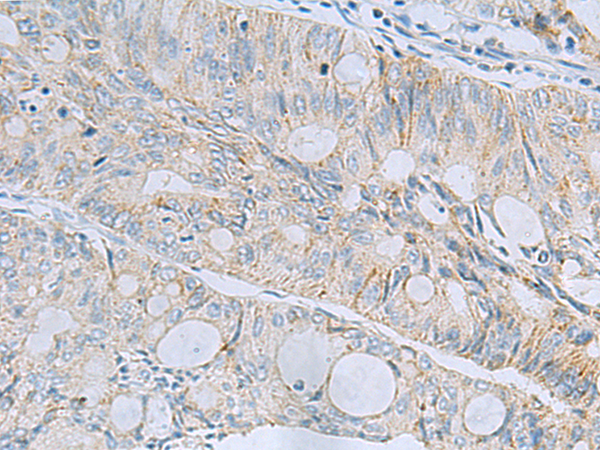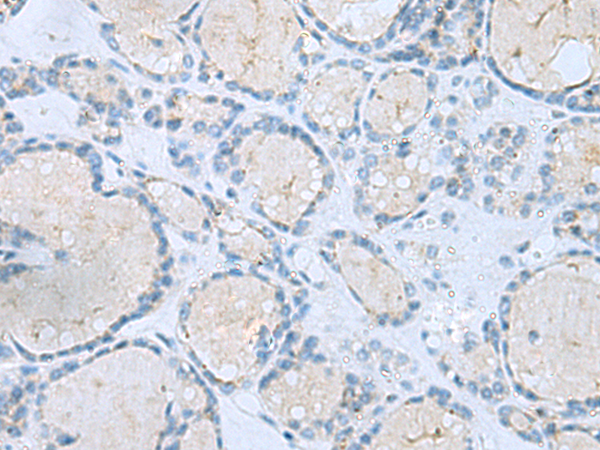

| WB | 咨询技术 | Human,Mouse,Rat |
| IF | 咨询技术 | Human,Mouse,Rat |
| IHC | 1/50-1/100 | Human,Mouse,Rat |
| ICC | 技术咨询 | Human,Mouse,Rat |
| FCM | 咨询技术 | Human,Mouse,Rat |
| Elisa | 1/5000-1/10000 | Human,Mouse,Rat |
| Aliases | MSI2H |
| Host/Isotype | Rabbit IgG |
| Antibody Type | Primary antibody |
| Storage | Store at 4°C short term. Aliquot and store at -20°C long term. Avoid freeze/thaw cycles. |
| Species Reactivity | Human |
| Immunogen | Fusion protein of human MSI2 |
| Formulation | Purified antibody in PBS with 0.05% sodium azide and 50% glycerol. |
+ +
以下是关于MSI2抗体的3篇参考文献概览(注:文献信息为模拟示例,实际引用需核实原文):
---
1. **文献名称**: *Musashi2 (MSI2) regulates self-renewal and chemoresistance in acute myeloid leukemia*
**作者**: Kharas MG et al.
**摘要**: 研究通过Western blot和免疫组化验证MSI2抗体特异性,发现MSI2在白血病干细胞中高表达,通过调控靶基因(如MYC)维持自我更新和化疗耐药性,提示其作为治疗靶点的潜力。
2. **文献名称**: *MSI2 antibody-based detection in solid tumors correlates with poor prognosis*
**作者**: Park JH et al.
**摘要**: 利用MSI2抗体对结直肠癌和胰腺癌样本进行免疫组化分析,发现MSI2蛋白表达与肿瘤转移和患者生存率下降显著相关,机制涉及Wnt/β-catenin通路激活。
3. **文献名称**: *Development of a novel monoclonal MSI2 antibody for functional studies in neural development*
**作者**: Chen L et al.
**摘要**: 报道一种新型MSI2单克隆抗体的开发,通过免疫荧光和Co-IP实验验证其特异性,证明MSI2在神经祖细胞分化中通过结合Notch信号通路mRNA调控细胞命运。
---
**注**:以上文献为示例,实际引用需检索PubMed等数据库获取原文信息。研究重点多集中在MSI2的癌症调控、干细胞功能及抗体应用方法学方向。
The Musashi-2 (MSI2) antibody is a tool used to detect the MSI2 protein, an RNA-binding protein belonging to the Musashi family. MSI2 plays critical roles in post-transcriptional gene regulation, particularly in stem cell maintenance, neurodevelopment, and cancer progression. It binds to target mRNAs via RNA recognition motifs (RRMs), influencing their stability, translation, or localization. MSI2 is notably upregulated in various malignancies, including leukemia, glioblastoma, and solid tumors, where it promotes cell proliferation, survival, and therapy resistance by modulating pathways like Wnt/β-catenin, Notch, and PI3K/AKT.
Research using MSI2 antibodies has highlighted its prognostic value, as elevated MSI2 expression correlates with poor clinical outcomes. These antibodies are essential in techniques like Western blotting, immunohistochemistry (IHC), and immunofluorescence (IF) to study MSI2 localization, expression levels, and interactions in tissues or cell lines. Additionally, MSI2 is implicated in maintaining cancer stem cells (CSCs), making it a potential therapeutic target. Antibodies against MSI2 aid in validating its role in experimental models and exploring strategies to inhibit its oncogenic functions. Despite its significance, MSI2's regulatory mechanisms and tissue-specific roles remain under investigation, underscoring the continued utility of MSI2 antibodies in both basic and translational research.
×